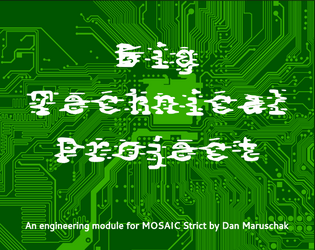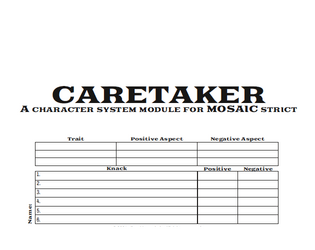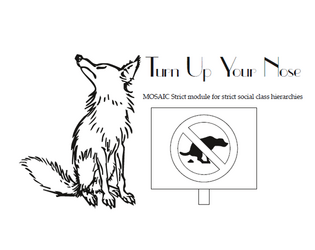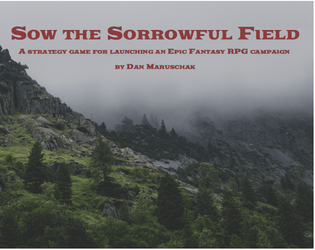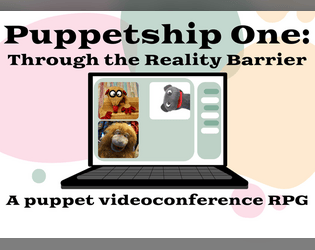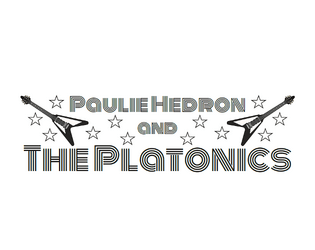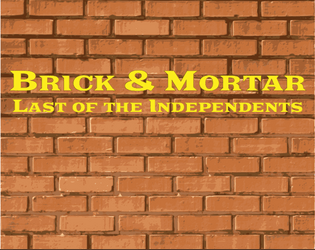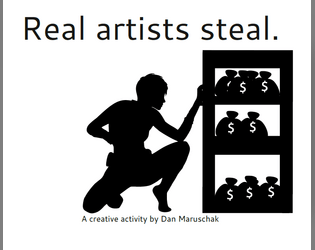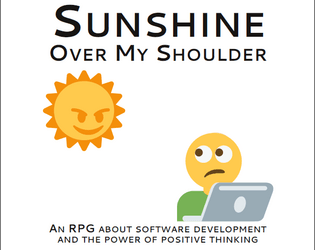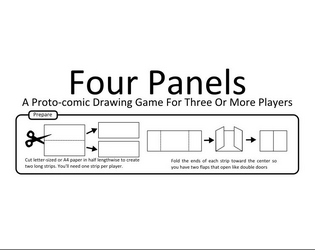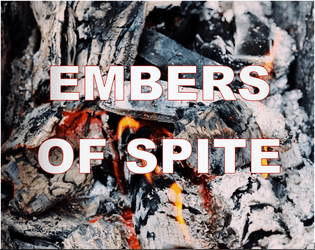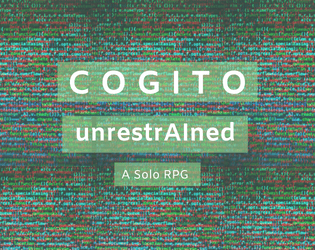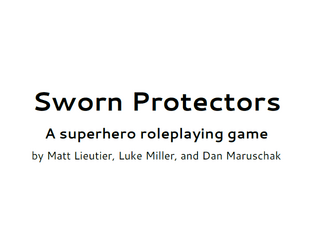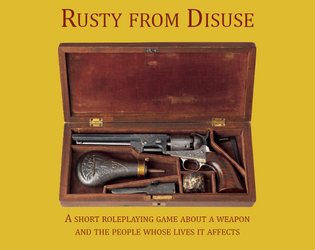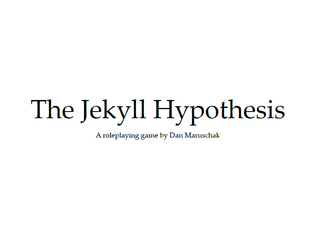Good questions! The intention is that quality can never go below zero but there's no upper bound. The number of tests in the suite is something the players can know and roll for themselves (and writing tests can add to an existing test suite or start a new one, for example one test suite might be focused on the engines while a different test suite is for the weapons and defenses), the hidden information relates to the numbers in the use cases, not how many use cases there are. The idea is that you know how much you've tested, but you only have an educated guess about how well that corresponds to how well you've tested.
GameMaru
Creator of
Recent community posts
Thank you for the kind comment! On the issue of the polarity of the answer and which aspect to focus on, I think they are both interesting. The way it's designed in the module, the focus is a little more on the situation where a character does something familiar but the prompt gets them to consider if they're doing it differently or for a different reason. The way you thought it should work is a little more focused on using whether or not they've done an action to draw attention to the fact that elements of their character may have changed. I think the way you propose might be a little more conducive for a "dramatic" style of play where characters change more across the course of play, while the way I originally designed it expects the characters to be somewhat stable and invites players to contemplate the nuances around subtle variations around a steady central theme. Honestly, before you asked the question I hadn't really considered doing things the way you propose, the way I originally came up with seemed to fit well enough to me that I didn't consider doing the opposite. I think the way I did it originally still makes more sense to me, but the way you thought it should work seems like it could be a cool and interesting variant.
I think being grounded in the real world of play does tend to lead to better conversations than pure abstractions. While I think the Forge's later strategy of "You're only allowed to talk about Theory via AP posts" was flawed (not least because Forge-style AP posts became a genre with their own social dynamics around them) I think the idea was well-intentioned. Trying to come up with actual examples that illustrate ideas, or ways you think you could test your ideas out, probably helps keep things from spinning out into styles of interaction that can be more emotionally charged.
I feel like at the end of the day a debate on any art form, when given enough time and energy, will always devolve into "relativism vs. empiricism," and trust me I've already been made to sit through way too many hours of art school students and professors literally screaming at each other, sometimes nearly coming to blows, about that very topic, while all I wanted to do was go back to the studio and work.
Here's an idea: how about we ask the relativists to let the empiricists try to do the work that empiricists think they can do in peace rather than being screamed at by relativists? If the empiricists are wrong their own work should eventually do a good job of demonstrating it. If it's all fantasy then what's the harm in letting them fantasize in peace?
Personally I feel that the "nothing can ever be said to work better than anything else" position is far more aggressive than most theory ideas I've seen articulated, and it's often tossed around without any of the "I feel that..." "It's my opinion that..." "I could be wrong, but..." caveats that anti-Theory people often insist on from others. I think it is fundamentally anti-game-design: If I make a change to a game I'm designing that I believe makes it "work better", are you claiming that I'm deluding myself, and that neither version works better or worse than the other? It is not an intrinsically friendly, neutral position, it is making strong claims.
I see tabletop design as an art and not a science
And aircraft design isn't an art? A lot of aircraft designers would probably be surprised by that take! My view is that engineering has elements of both science and art.
In the practice of ttrpg design, as in any art form from musical composition to baking, there are no immutable laws.
It's interesting that you chose baking as an example, in lots of shows I've seen that focus on baking they stress that it's a much more scientific discipline than cooking since there's a lot of chemistry that goes on while baking so recipes matter a lot more.
Things only "work" and "don't work" in relation to a specific individual or a group.
Presumably you're aware that this itself is a definitive statement. Personally I think relativism and treating everything as utterly subjective goes too far. I agree that people shouldn't be jerks about asserting that they have answers they don't really have. But I also think that presupposing that everything is arbitrary entails that game design (or cooking) is not a craft or skill that can be learned or developed, and I disagree with that. Asserting that everything is due to individual differences among people or groups seems to me like jumping to a conclusion.
There's a quote I've seen attributed to psychologist Kurt Lewin: "Nothing is as practical as a good theory." It makes sense to me that not everybody cares about all aspects of things, and that getting close to the "basic physics" type of stuff can be a turnoff for some. Personally, I'm of the mind that there's not always a clear boundary between physics and engineering. I know that I've found contemplating some low-level theory stuff helpful in my game designs, e.g. my drawing game Four Panels owes some of its function to me trying to think about Forge GNS theory, specifically I was wondering if the "core loop" of "Simulationism" was just making aesthetic contributions to a larger whole, and then swapped in making physical drawings (a different kind of aesthetic contribution) into that simplified model and got a game that works pretty well. I also found that contemplating what makes something a roleplaying game rather than a different kind of game useful when I was working on Last Year's Magic (my provisional theory on that is that a game has roleplaying if viewing the world through the lens of particular characters is a meaningful component of play).
I think the "what's it used for?" question is a good one. I think of RPG Theory as being the way to understand and design games in the same way that Aeronautical Engineering is the way to understand and design aircraft. This was historically complicated by the fact that early RPGs didn't necessarily supply the full game design to the players -- at the very least the GM was expected to design dungeons or adventures, if not figure out how to make a disparate bunch of subsystems interact usefully at all -- so a lot more people needed to be interested in the stuff of game design than just people who called themselves game designers. Also, a lot of early discussions were framed in terms of "How to be a better GM" or "How to be a better player", so there is some expectation that RPG Theory should speak to that. That's kind of at the core of the "System Matters" vs. "System Doesn't Matter" debate -- if each game is its own thing then naturally each game would work differently and would need to be understood on its own terms, but if each game is but a particular flawed attempt to instantiate True Roleplaying then claims about how "roleplaying" work are potentially relevant to everybody.
It's a common perception in online RPG discussions to view discussions of RPG Theory as either inherently toxic or so likely to become toxic as makes no difference. Having participated in some RPG Theory discussions at various times and various places I can attest that there is evidence for this view, it is not unheard of to see acrimony, bad-faith arguments, etc., on this topic. I'd like to discuss what, if anything, causes this, and also what might be done to try to improve discussions. I'm going to list some ideas I've had on the topic, but they are certainly not definitive or exhaustive.
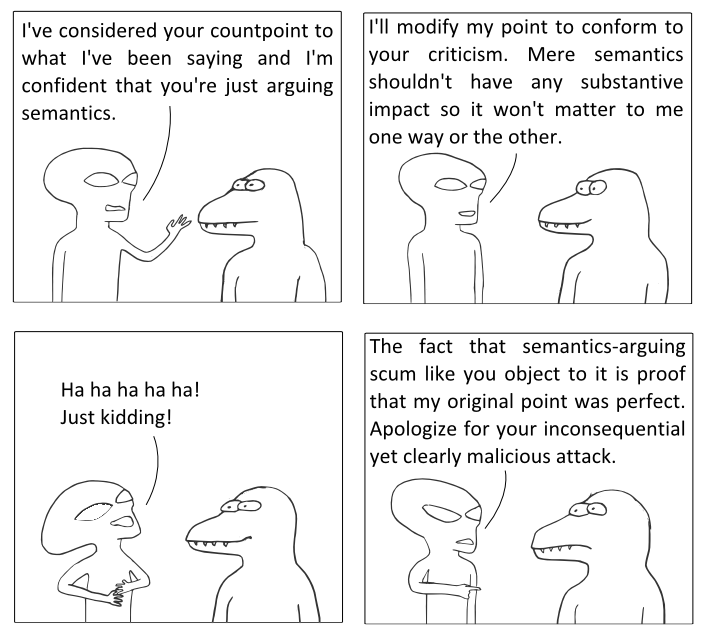
Is it really that bad? One thing that's worth considering is that it's not unheard of for people's perception of a problem to be at odds with reality. For example, it's a well-documented phenomenon that people can believe that crime is rising in their city when it is fact falling. Things like sensationalized news stories can give people a sense that something is a big problem even if, statistically, it's not. Are RPG Theory discussions more toxic or acrimonious than other types of discussions? Do we have any data, or are people mostly working from gut feeling?
Status Quo Maintenance: The perception that RPG Theory talk is toxic tends to discourage new people from participating in the conversation, while those with high enough status to avoid criticism can still talk about it if they want. This can reinforce existing status hierarchies, for good or ill.
Moralized Language: We know from politics that incendiary or moralized language can lead to increased support from supporters and increased anger from enemies, so it's not surprising that politicians and commentators lean on it much more than nuanced, thoughtful analysis. A similar pattern can happen in theory talk.
Trying to win arguments rhetorically rather than analytically: A lot of notorious RPG Theory topics seem to be associated with particular turns-of-phrase or wise-sounding aphorisms. These sort of things might be more prone to causing breakdowns in discussion than analyzing things on the merits.
Taxonomy may be a questionable approach: A common theme in some RPG Theory approaches is to "taxonomize" various things, such as GNS Theory's attempt to classify a series of "Creative Agendas" or Robin Laws' player-types. While putting things into categories or affixing labels isn't always intrinsically harmful, it runs so closely to insulting people or establishing hierarchies of value that it can often slip into that, either intentionally or unintentionally. Additionally, there's a risk that affixing labels can cause an illusion of explanation: if I say "the reason you have an intense fear of spiders is because you have arachnophobia" it looks similar in form to an explanation, but actually doesn't do any of the work of one -- you've just put a name on the phenomenon. Rather than trying to taxonomize things into groups, I suspect an "anatomy first" approach -- where the effort is to understand how particular games (or games in general) work -- probably leads to fewer hard feelings.
Bad Theories: It's not clear that there's much value in some of the past theorizing that occurred. There's definitely some that I personally think led to wrongheaded dead ends. As such it may seem like a low ROI activity to many, and may seem worth frowning on regardless of whether it is actually toxic or acrimonious.
Conflicting interests: Being seen as an expert on how games work is probably beneficial for a game creator, so there are a lot of incentives besides "is this true?" that can be in play when people pontificate about Theory. It's hard to be aware of how your own biases can distort your perception.
Psychology: People who post about RPG Theory are just as susceptible to things like Confirmation Bias as anyone else.
Those are some of my initial thoughts.
Back in the Google+ era of online gaming I developed a Hangouts plugin called RPGHUD that worked as a dice roller that would overlay the results in a visual form on top of your video feed so people can be "heads up" looking at your dice while they're looking at your video feed rather than looking down at a map-based VTT or over at a chat log or whatever. Google end-of-lifed the API that made it possible so I thought the tool was dead, but recently I decided to try to resurrect the tool for the Zoom gaming era. As far as I understand things there's no way for regular people to create their own Zoom filters, but OBS (the software that most video game streamers use) has a mode where it "streams" to a virtual web cam that you can tell Zoom to use as an input, so this new version is just javascript and HTML and you configure OBS to display the page with the dice results on its internal browser and overlay it over your normal webcam. If you are interested in trying it out there are instructions here: danmaruschak.github.io/RPGHUD/ (I'm treating this as an alpha right now, i.e. I think it has all the features in needs to work but I won't know for sure until some more people try it).
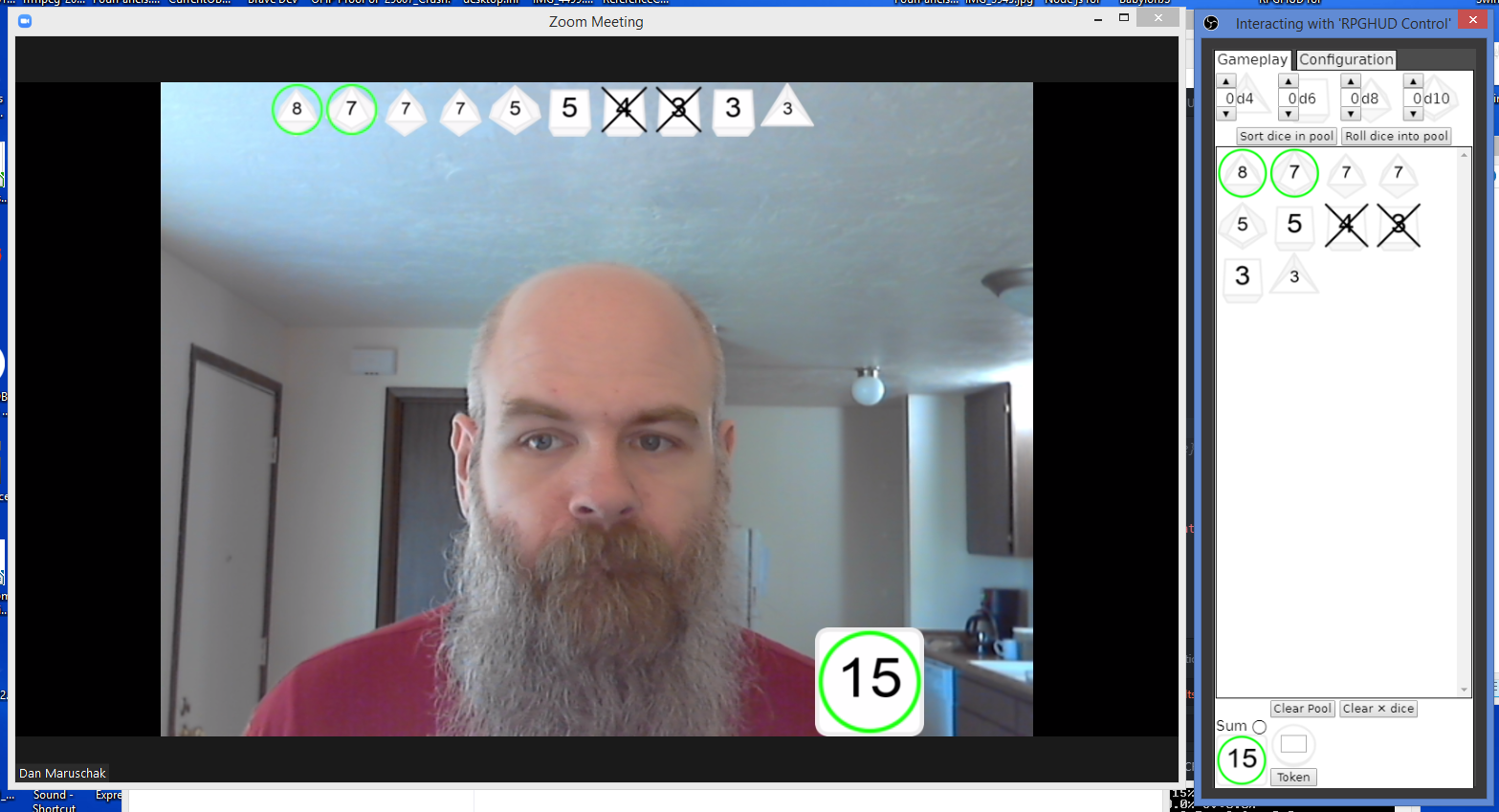
The main idea I'm theoretically working on (once I finish some things I need to get done before the holidays) is something involving making your own Tarot deck. The draw-on-the-cards thing from Other Worlds is an inspiration there, and the current plan is that different players will have some responsibility for each suit of the minor arcana (inspired by Quarterdeck), and you need to create the Major Arcana by doing random TVTropes pages (inspired by All-Devouring Monomythic). I was originally thinking it would be a parallel worlds thing and you'd have a story based around politics and journalism but that felt pretty flat to me, so I'm currently thinking of going in a more supeheroes kind of direction. It will likely have a card-drafting element, like in An Unfinished Draft. I haven't really written anything down yet, though, and I'm kind of vacillating on whether I think I can make it work.
I have a backup idea, which takes the "simple strategic wargame" thing from A Theoretical Tactics Game and the "your hitpoints are you party" thing from Colander: have a simple light wargame where one player is the Dark Lord and the rest of the players are the Last Alliance, and you play out the battle where the alliance fails to stop the Dark Lord from seizing power, but the process helps do the world- and character-building to set up an Epic Fantasy scenario (e.g. the survivors of the units from the various factions are PCs, or NPCs who learned vital information during the confrontation, etc.). I'm not sure if that's just the setup phase for a game I would design, or if it's kind of like a scenario generation bolt-on for a more conventional RPG.
Also, I think that the situation sketched out in The Body Comes Alive would mesh well with the mechanical structure of my game Rusty from Disuse, but I don't think I'm the right person to write a game like that. I'd be open to collaboration if somebody else was interested, though.
One of the rules is:
- 2020's Best - Please only submit work you did during this year
I'm guessing that this is just to exclude things that were released on previous years, but a game I'm considering submitting was published in final form this year but was based on something I did for a design contest in a previous year, so a really strict reading of the rule might exclude that one since a chunk of the "work" wasn't done in 2020. Is it sufficient that the thing you submit includes work done in 2020, or should it be 100% from 2020?
Generally I am left a little bit cold by games that call for a lot of world-building, especially if it requires a lot of whole-cloth authorship, but in this game I think there's something very interesting in the planetary worldbuilding stage in this game where you're partially shining a light on the principles of the ancient entities to generate an interesting "shadow shape" to engage with on this particular planet.
My reaction to this game was to feel some tension between the suggestion to take it in a LARPy direction and the way the mechanics feel more like a sit-around-a-table kind of game. But things like the pettiness of stealing a die from someone else to use on your roll seem like they are very evocative of the theme the game is going for, so I like that.
While reading the game I found it a little hard to get engaged, since a lot of the concrete details get created at "run time" by the group actually playing it. But there are some interesting things here, such as the way it randomly distributes "GM-ish" goals to the various players in a scene -- I'm curious to see how that sort of thing would work in practice.
Personally I am skeptical about whether it will be effective to use other games as the "bottom level" in the three-level structure of this game -- since other games aren't designed to be used as cogs in bigger machines it could be awkward, especially if aspects of [insert game here]'s design is touching on things that the "meta" levels in this game are trying to handle, so I would worry about friction between the different levels. But despite my skepticism I do think there's something interesting about looking at the different "meta" layers of the story/situation in the way this game does.
With the title of this game being "Triage" and it saying it's about "healing through the power of friendship, service, and other magics" I was thrown for a bit of a loop when the situation is more like a D&D-style adventuring party rather than some sort of medical caregivers. And I found the rules in the beginning a bit hard to absorb because they were presented so abstractly. But once I hit the character sheets with the more specific, concrete, grounded questions things started to click for me. The system seems really intriguing to me, with aspects of "ritual phrases" / conversation flow stuff and constrained choices working together in an interesting way to introduce problems and adversity into the generally cooperative GM-less structure.
I like the premise of this game, I think the fairy vibe and the dreamscape exploration seem like they go together really well, and I like the way there's a dream-logic aspect to "harvesting" the dream. With the mechanics I might worry that everything mapping to a single positive/negative axis might feel a little flat, but I think the setting and situation aspects of the game are good.
The premise of this game is nice, the way it plays the mundane and fantastical off each other seems like it can achieve something that might not be there in either a purely mundane or purely fantasy game. The way that the scenes play out seems to lean a little more toward the freeform than is my personal taste, but I can see how people would enjoy the "everybody grooving to the same vibe" style of play.
I don't have much experience using dominoes so it's a bit hard for me to get a sense for how some of the mechanics will work in terms of probabilities, etc., but I think the domino tables for things like the village name and economy are a pretty neat way to incorporate a distinct element of dominoes.
I mailed in my submission for the second round a few minutes ago. When I first got the game from round one as my starting point I wasn't sure what I could do with it. But eventually I saw some thematic connections between it and some other ideas that are relevant to me right now, and I think it coalesced into a pretty solid game concept. (It's hard to talk about these things while avoiding details that would bust anonymity!) I'm not sure what else a third designer will be able to do with it, but I guess someone else will need to figure that out if and when they get my game in round 3.
I mailed in my round 1 submission a few minutes ago. I had hoped to come up with something completely original for this jam but I've been having a rough week so I went with my backup plan of adapting an old idea that I thought was good but I never really fleshed out. I didn't want to tempt myself with the option of making minor tweaks and edits until the deadline so I mailed it in as soon as I was satisfied that I had something I thought was good enough.
An idea I've had that I don't think I would ever develop on my own is to combine the gradually color-changing water idea with melting ice: you make ice cubes out of intensely colored water, put the cubes into a container of clear water, and then as the ice melts the water gets progressively more tinted. I figure you would incorporate this with some sort of token-draw mechanic, where it's easy to tell the tokens apart through clear water and impossible to distinguish them in the fully tinted water, so it's easier to pick exactly the result you want in the early game but it becomes harder to pick the ones you want in the late game. (There might also be a painfulness tradeoff related to immersing your hand in ice water). I think the broad strokes of this idea are sound, but it would probably take some experimentation to figure out if it would actually work.
Since preparing the water/ice thing would be pretty elaborate to set up, it seems like it would make sense to make the game some sort of party game. Like Can you hear me?, I think the idea of the obscuring water being related to psychic visions makes sense. So my thought is that the game would be a "murder mystery party" kind of game, with the hook being that all of the guests are psychics and the way you have a "psychic vision" is to stick your arm into the slowly-obscuring water/ice container and draw something from the bottom.
Although I think this is an idea that could work it's not really the kind of game that I have any experience with, so I don't think I'd develop it on my own. If somebody who felt more confident about the party-game/LARPy elements was interested in pursuing this I might be open to collaborating (or if a group of people think it's a good idea feel free to run with it without me).
Another 2018 200-word RPG I thought was interesting was Can you hear me? by Eleanor Tursman. It has a mechanism where you add drops of color to water to make it harder to see through over the course of the game (drops of ink in the original). It seems like you could maybe do some interesting things with this, for example a token draw mechanic where it becomes harder over the course of the game to figure out which color token you're drawing from the colored water. It would probably take some physical experimentation to see what works and would be practical for actually playing.
My 200-word RPG from 2018 No Devil-child May Rule Us is about excessive certainty in politics, and allegorically about government scandals where law enforcement and intelligence agencies are involved.
In the Threeforged contest, I thought the "Space Race-punk" aesthetic of Shadow of Ares (by Victor Andrade, Ashton McAllan, and Chris Bennett) was brilliant. We're a little past the 50th anniversary of the Apollo 11 moon landing now. That era still has some powerful imagery and feelings attached but we don't often see it used it in science fiction.
Here's my first attempt at the "Science" subsystem.
Creating the Science Matrix
Before the game begins, roll 8 d4's for each row of the matrix. Count up the number of dice that correspond to the column number, add 1, and put that number in the cell. So, for example, if you rolled [3, 4, 1, 1, 2, 3, 4, 1] for the Surgery row, you would fill in 4, 2, 3, 3. For the MISC row, add 3 rather than 1 to the d4 roll.
|
# |
Abbrev |
Area |
||||
|
1 |
INC |
Increase Essence Strength |
||||
|
2 |
DEC |
Decrese Essence Strength |
||||
|
3 |
REDF |
Redefine Essence |
||||
|
4 |
EXT |
Extract Essence |
||||
|
5 |
INS |
Insert Essence |
||||
|
6 |
MISC |
Some other essence manipulation not covered by above |
||||
|
7 |
SURG |
Surgery |
||||
|
8 |
FLUID |
Injecting/Extracting bodily fluids |
||||
|
9 |
CHEM |
Laboratory Chemistry |
||||
|
10 |
BODY |
Internal Body Chemistry |
||||
|
11 |
MIND |
The use of the will, concentration, or altered mental states |
||||
|
12 |
ENV |
Extreme Environmental Conditions |
The science of essence manipulation
This science is still a very new field. Not much is known about it. Indeed, the results of Jekyll's experimentation are about the only thing that is known for certain. To wit, a certain chemical mixture, when ingested, enabled Dr. Jekyll to suppress certain essences which he considered his “good side” leaving only his “evil side” active. The change affected both Jekyll's personality and physical form, although his memories remained intact across transformations. The duration of the effect eventually became erratic, with the transformation sometime ending on its own, sometimes requiring another ingestion of the mixture to reverse, sometimes happening spontaneously in the Jekyll form. However, even Jekyll himself was not fully aware of how to replicate his process; before his death he determined that an unknown impurity in his initial batch of formula was a key component in its efficacy.
In order to maintain the spirit of empiricism, players of this game will never know for sure how things work. The functioning of this field of science will partly be determined by a dice-rolling procedure that the GM conducts before play begins. The GM keeps this information secret from the players while the game is in progress. By conducting experiments players, like the characters they control, may gain some insight into the way the science functions, but science never provides certainty, especially in such a new field. Jekyll thought he understood what he had discovered, but he only partly understood. On the other hand, those who never dare to explore understand nothing at all.
In order to “explore” the science of essence manipulation, the GM must make a virtual “map of the territory” before play begins. This takes the form of a large matrix. The rows of the matrix correspond to aspects that might be involved in an essence-manipulation process. The columns are abstractions that represent that some things work better than others.
When a player wants to develop a process they'll describe what they're trying to do, and map that onto a series or corresponding matrix cells. For example, if Dr. Jekyll were a player character, he might have said that he wanted to create a chemical mixture that would operate inside a person's body to target a particular subset of essences and reduce their strength to zero. For each major category you roll a d4 to see which column of the matrix it uses. So, in game mechanics terms, Jekyll's formula could be CHEM3-BODY2-DEC4 (the numbers correspond to random d4 die rolls). Someone else might propose a process by which a person's blood is extracted, heated under intense pressure, and then reinjected into the body in order to increase the strength of an essence. This could be FLUID3-ENV1-FLUID2-INC1. Then roll a d6. If you have less components in your process than the number on the d6, add MISC components to the process (sometimes it turns out to be harder to create elegant processes than ones that might seem complex on the surface).
Once you have the sequence, the GM will add the numbers in each cell of the matrix to determine the difficulty to compare to the die roll in a Devise a process scene. If the numbers are low this sum may correspond to a simple task that's merely waiting for someone to try it for the first time. If it's difficult perhaps it's possible, but requires some expertise to perform the required delicate procedures to get the right efficacy. Some may be so difficult that they're effectively impossible to do that way – sometimes science doesn't care how much you'd like to achieve something, it just can't be done (just ask the alchemists who hoped to turn base metals into gold). However, the GM will never tell any players what the actual difficulty number is. The only way to know for sure is to experiment, and see if the results are what you expect them to be – if your mechanical roll to invent the procedure is lower than the difficulty number the GM may alter the actual effect relative to your intended effect based on some rules. Sometimes this might be as simple as being fatal to whoever is being subjected to the process, sometimes it might be subtle, such as the intended effect working perfectly but a second essence being redefined as a side-effect. Regardless of the relationship between your roll and the difficultly number, the process (if performed correctly) will always “succeed” at producing the same effect in the future. Maybe a mistake in one area could be a serendipitous solution for another.
As I mentioned in the introduce yourself thread, I'm working on a game set in the world of the story "Strange Case of Dr. Jekyll and Mr. Hyde" by Robert Louis Stevenson. The PCs will all be people in Victorian London who are studying this new and disreputable science of nature/essence manipulation because they think it's the way to address some personal drive that can't be satisfied by conventional means. I don't have a title yet. I think referencing the original story is probably a must, but I haven't settled on anything I'm totally happy with yet. Right now I'm thinking of something scientific-sounding that refers to Jekyll's experiment or process, or that these people are working in the same field as Dr. Jekyll. So something like "The Jekyll Conjecture", "The Jekyll Process", or "The Jekyll Hypothesis", or something along the lines of "Jekyll's Contemporaries" or "Jekyll's Colleagues". I'm open to suggestions if people have any.
Mechanically, characters are going to have a bundle of freeform traits called "essences". So you might have essences like "strong", "precise", "arrogant", "greedy". Eventually there will be mechanics related to manipulating these essences directly (enhancing, suppressing, extracting, inserting new ones, etc.) but I haven't written those yet. Basically I want Jekyll's potion that turned him into Mr. Hyde to be something that you could duplicate with these mechanics if you were so inclined, once you had figured out the chemistry of how to make it.
This morning I made my first attempt at writing out some dice mechanics. Here's what I have so far:
Rolling the dice
When the mechanics call for you to roll the dice, the GM will compare your essences to the task at hand.
First, they'll figure out the strength of your positive dice by identifying the most apt essence for what you're doing. For example, if you are performing surgery your precise essence might be the essence that seems most apt. The strength of this essence will determine the size of your positive dice from among d4, d6, d8, d10, and d12. Add 6 to the strength of your apt essence, and find the biggest die that couldn't roll higher than that number. So if your precise essence had strength 5 then you would be rolling d10s [6 + 5 >= 10], but if it was strength 6 you'd be rolling d12s [6 + 6 >= 12].
Second, they'll figure out the strength of your negative dice by identifying the essence that's most opposed to the action. For example, while performing surgery your impatient essence would be running counter to what you were trying to achieve. The strength of this essence will determine the size of your negative dice from among d4, d6, d8, d10, and d12. Take 10 and subtract the strength of that opposed essence, and find the biggest die that couldn't roll higher than that number. So if your impatient essence had strength 3, you'd be rolling d4's to perform the surgical procedure.
The process of identifying an apt and opposed essence must find one that are genuinely aligned or opposed to the actions. All humans are considered to implicitly have every essence at strength 2 in addition to whichever ones are tracked on your character sheet, so in the worst/base case scenario you'll have a strength 2 essence for your apt and opposed essences if none of your explicit essences seem to apply.
Third, the GM will go through each of your essences and decide whether it's a positive essence for the task, in which case you'll add a positive die to your hand, a negative essence for the task, in which case you'll add a negative die to your hand, or a neutral essence for the task in which case it won't contribute dice. You'll roll at least one positive and one negative die for each roll, in the case where your explicit essences don't seem to apply (for example, perhaps all your explicit essences seem positive or neutral) one of your strength 2 implicit essences will contribute a die.
Finally, you'll roll your handful of dice and compare the result to the target number determined by the mechanics for the type of roll you're making (which will usually be set by the type of scene). In general, dice that get results greater than or equal to the target number will result in achieving some degree of success at the task you were trying to achieve, while dice that roll below will often result in the accumulation of stress or complications.
Note: The rules give the responsibility for analyzing your character's attributes to the GM. This is because you may not be aware of the strength or exact definitions of your own essences! In a game where you might be experimenting on yourself with brand new techniques that can alter your essences you won't always have perfect information about your own character. Dr. Jekyll discovered what it was like to be Mr. Hyde by being Mr. Hyde. Of course there are mechanics that can help you determine the strength of someone's essences, and you can certainly use those mechanics on yourself if you are so inclined.
I'm a little concerned that this will be clunky (and this is already my attempt keeping things streamlined). I'm trying to have both the strength of essences and which essences you have be relevant to your rolls. But having lots of essences and them all having numbers attached might be too much. In the original story, the fact that Jekyll had powerful urges toward both goodness and sin were issues with him -- his opposed nature was getting in his way no matter what he was doing, but once he suppressed some of the more noble parts of his character he was able to fully enjoy himself as Mr. Hyde (which had the surprising effect of making him less burdened by stress as the full person of Dr. Jekyll so he was more able to do good works in that persona). So I'm hoping to capture some of the spirit of that in the mechanics.
No, the essences will be more like freeform traits, like "violent" or "generous". Before I started writing I thought I was going to take some inspiration from a previous game I've written where the traits all have a positive and negative aspect (an example from that game: the "genius" trait had the positive aspect "clever" and the negative aspect "arrogant"), but as I've been thinking about it I'm not sure if that will work. I realized today as I started writing the game that my ideas about how I want the mechanics to work are still pretty fuzzy.
I definitely have trouble with titles, and I may ask for suggestions later in the week, but I want to focus on my mechanics first.
Hi. I'm Dan Maruschak. I live in Eugene, Oregon, USA. I've designed several RPGs as part of design contests over the years, but I haven't commercially published any yet.
The idea I'm working on for #RPGenesis is inspired by the story of Dr. Jekyll and Mr. Hyde. In the story Dr. Jekyll hints that his ideas about human nature containing both good and evil elements are just the beginning. He suspects that further study by others will reveal that humans are a bundle of disparate natures. My game (I'm still trying to think of a good title) will be about the colleagues and contemporaries of Jekyll who are studying this new and disreputable science, conducting their studies and experiments in pursuit of their own goals. Since the science involves manipulating the essences and nature of people there will likely be dramatic or horrifying results from some experiments, as Jekyll himself discovered. This is an idea I've toyed with before but never made progress on because the mechanics I was trying to use were too complex and cumbersome. I'm hoping that working on this as part of RPGenesis will help me take a fresh look at the idea and hopefully come up with a mechanical design that works.



